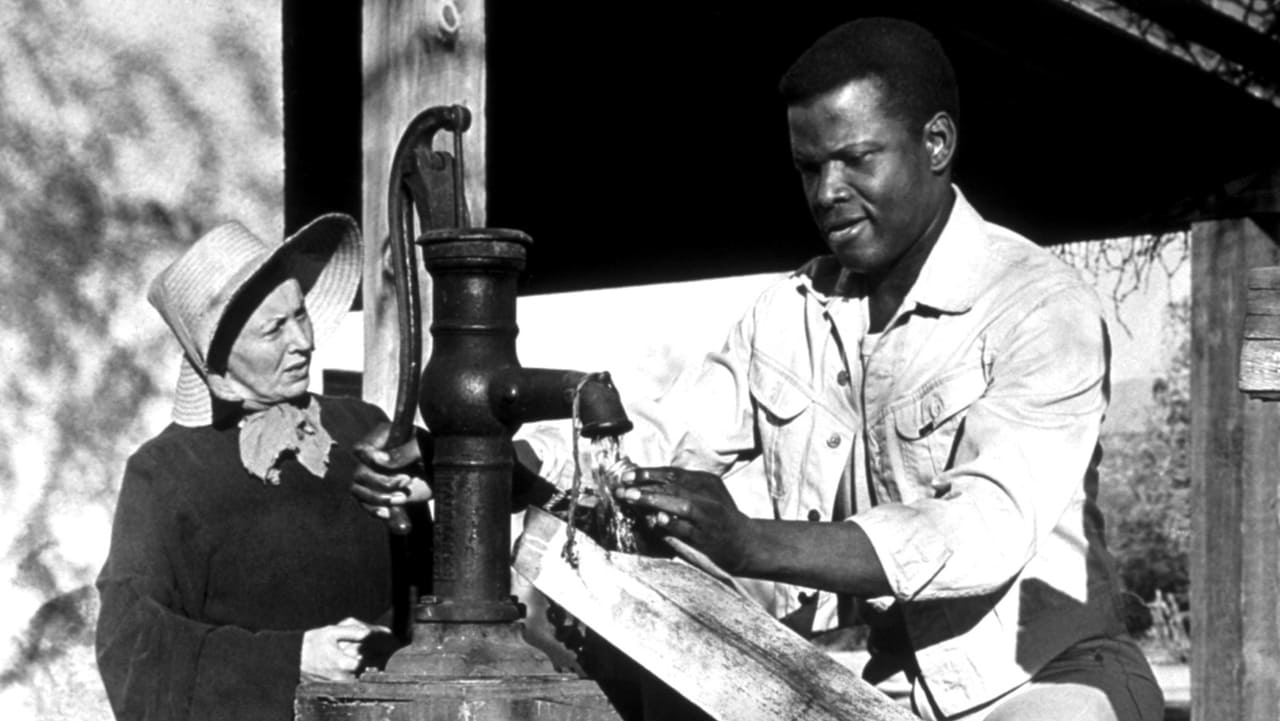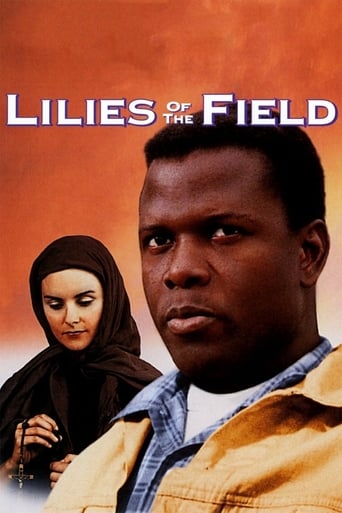NekoHomey
Purely Joyful Movie!
Flyerplesys
Perfectly adorable
StyleSk8r
At first rather annoying in its heavy emphasis on reenactments, this movie ultimately proves fascinating, simply because the complicated, highly dramatic tale it tells still almost defies belief.
Erica Derrick
By the time the dramatic fireworks start popping off, each one feels earned.
calvinnme
Homer Smith (Poitier) is driving along a hot desert highway when he realizes that he needs water for his car radiator. He pulls up to a remote convent of German-speaking Catholic nuns. Poor, unsuspecting Homer thinks he'll just get the water and be on his way. But it soon becomes apparent that he's going to be roped into doing work for the Lord.Despite the movie's religious theme, this is not an hour-plus long sermon. This is a charming, humorous, wonderful movie. As usual, Poitier embodies his character with naturalness and ease. Though Homer tries his best to stay independent, arguing and threatening to leave the Catholic group on any number of occasions, he's also charmed by the innocent, and at times childlike, sisters. I loved watching Homer scrap with the hard-nosed Mother Superior in particular, whom he sarcastically calls "Mama". They are both stubborn people, for different reasons. She orders him to go to Mass ("I'm a BAPTIST!", he responds, but he goes!), and her declaration that he will be building their chapel sends him into a hilarious temper tantrum. But the viewer already knows he's in for it… Still, we don't anticipate the wonderful events that unfold around the building of it, and the insights we get into Homer Smith's character.I love the scene where the nuns ask Homer to play the guitar. He picks it up and strums, "Frankie and Johnny were looo-verrs…" The nuns sit looking at him silently, blankly. Homer quickly stops himself, looking as if he were wishing there were a hole he could crawl into.If one were especially philosophical, he or she could see this film and think of a higher theme, where there are times when each of gets into life situations where we fight and feel helpless, but in the end it was all "meant to be", for a higher purpose. But even without trying to get any deeper meaning out of it, Lilies of the Field is just a funny film with well-drawn characters that's worth a watch.
MartinHafer
An out of work contractor (Sidney Poitier) happens upon an ODD group of nuns. After all, they are five East German nuns in the middle of the Arizona desert! While the nuns have no money and you have no idea why he stays, this Baptist man stays and helps them complete their chapel."Lilies of the Field" is a nice film filled with nice people doing nice things. It can't help but be a movie that people would enjoy, as it has a nice message and nice acting. However, I can't quite see why Sidney Poitier won the Oscar for Best Actor, as the film really didn't seem to take any risks and certainly won't offend. His performance was good but I think he certainly did a lot better, such as in "In the Heat of the Night" or "Edge of the City" or "Pressure Point"--all films which had a much riskier message and required more skill on Poitier's part. Mind you, I liked "Lilies of the Field"--I just didn't feel it was a particularly noteworthy film--though it is a nice family picture.
wes-connors
With his car overheating near an Arizona desert, Baptist handyman and ex-serviceman Sidney Poitier (as Homer Smith) stops to ask five Catholic nuns for water. In return, Mr. Poitier helps around the holy house and gives Mother Superior Lilia Skala (as Maria) and the group a lesson in speaking English. Poitier learns the nuns have traveled from East Germany. They believe Poitier was sent from Heaven, to help them build a new chapel. Poitier doesn't think he's up to the task, but God may have other plans… This was an understandable favorite when it bowed at the 1963 "Berlin Film Festival" where acting and directing awards were bestowed upon Poitier and Ralph Nelson. The wave of warm-hearted feelings and critical acclaim rode all the way home to the United States, where Poitier won the "Academy Award" for "Best Actor". This was an historical win; after 100 years, a struggle against institutionalized racism was reaching fruition. Poitier is great, although the "Amen" dubbing almost does his performance in...Released during pivotal events in the Civil Rights Movement, "Lilies of the Field" almost startlingly made no political points about race; instead, it paralleled the movement's wise use of religion and non-violence. By speaking softly, the film carried a big stick. This is not a great motion picture (outside of context), but "Lilies of the Field" helped provide many with hope, dignity, and inspiration. Poitier made it to the mountaintop. Climb every mountain, ford every stream, follow every rainbow until you find your dream.******* Lilies of the Field (6/63) Ralph Nelson ~ Sidney Poitier, Lilia Skala, Stanley Adams, Dan Frazer
tavm
Continuing my reviews of people of color in film in chronological order for Black History Month, we're now at 1963 when Sidney Poitier plays a role that would eventually make him the first black to win an Oscar for Best Actor in a Leading Role. That would be Homer Smith, an independent contractor who reluctantly gets roped by some German nuns into building a chapel for them having stopped near their convent initially to just get some water for his car. While he seems to get along fine with the others, Homer often has some choice words to say to Mother Superior Maria (Lilia Skala) especially concerning money and her ordering, comparing her at one point to Hitler. When the sisters stop at the outdoor mass, Smith stops at the nearby diner where he strikes up a friendly conversation with the proprietor, Juan (Stanley Adams), as they humorously discuss the sisters. Eventually, he leaves and then comes back, having gotten into trouble in between. He also offers his services to construction foreman Mr. Ashton (Ralph Nelson, this movie's producer/director). There's more to the plot than what I just described but now I'll just say that while Poitier is quite funny and charming, his character's motives are not always clear especially in the beginning when he seems condescending to the nuns especially when teaching English and "singing" "Amen" to them (I put quotations on the word singing because the voice you hear when that is performed is actually that of Jester Hairston, the song's writer). Still, Sidney does give his usual good performance though I do not think it's one of his best, certainly not compared to No Way Out or A Raisin in the Sun. But, on the other hand, Lilies of the Field isn't too overly sentimental as I'd feared these last 30 years of just hearing and reading about it. So on that note, it's highly recommended. P.S. That initial conversation between Aston and Smith when they call each other "boy" was one of the most edgy things I've heard from an early '60s movie!

